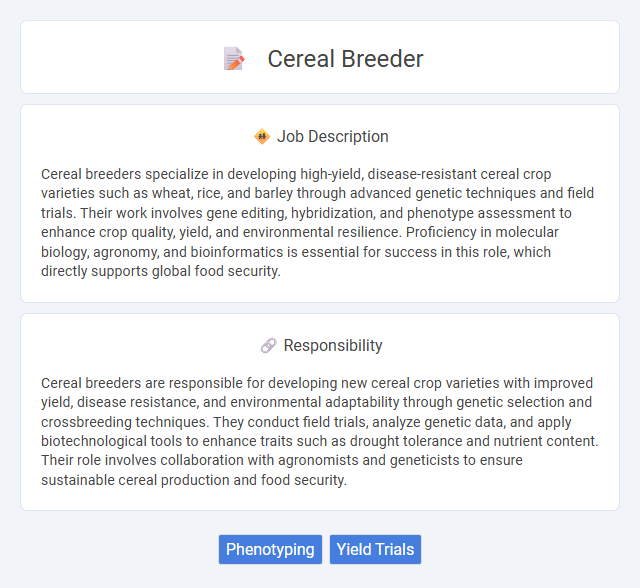
Cereal breeders specialize in developing high-yield, disease-resistant cereal crop varieties such as wheat, rice, and barley through advanced genetic techniques and field trials. Their work involves gene editing, hybridization, and phenotype assessment to enhance crop quality, yield, and environmental resilience. Proficiency in molecular biology, agronomy, and bioinformatics is essential for success in this role, which directly supports global food security.
Individuals with a strong background in plant sciences or genetics and a passion for agricultural innovation are likely suitable for a career as cereal breeders. Those comfortable with long-term research projects and fieldwork in varying environmental conditions may find this role fulfilling. Candidates who prefer dynamic lab environments or fast-paced corporate settings might face challenges adapting to the often seasonal and outdoor nature of cereal breeding.
Qualification
A cereal breeder typically requires a strong background in plant genetics, agronomy, or crop science, often holding a bachelor's or master's degree in these fields. Expertise in molecular biology techniques, data analysis, and field trial management is essential for developing high-yield, disease-resistant cereal crop varieties. Practical experience with breeding software and knowledge of climate adaptation strategies further enhance a candidate's qualifications in this specialized agricultural role.
Responsibility
Cereal breeders are responsible for developing new cereal crop varieties with improved yield, disease resistance, and environmental adaptability through genetic selection and crossbreeding techniques. They conduct field trials, analyze genetic data, and apply biotechnological tools to enhance traits such as drought tolerance and nutrient content. Their role involves collaboration with agronomists and geneticists to ensure sustainable cereal production and food security.
Benefit
Cereal breeders likely enjoy significant benefits including contributing to food security through developing high-yield, disease-resistant crops. This role may offer opportunities for innovation and collaboration with agricultural scientists, enhancing professional growth. Job satisfaction probably stems from combining scientific expertise with real-world impact on sustainable farming practices.
Challenge
Cereal breeders likely encounter significant challenges in developing crop varieties that can withstand climate change, pests, and diseases while maintaining high yields. Balancing genetic diversity with desired traits often requires innovative techniques and extensive field testing. The probability of facing unpredictable environmental factors means adaptability and continuous research are crucial to overcoming these obstacles.
Career Advancement
Cereal breeders specializing in crop genetics can advance their careers by gaining expertise in marker-assisted selection and genomic prediction techniques. Progression often leads to senior research scientist or lead breeder positions within agricultural biotechnology firms or government research institutions. Developing skills in bioinformatics and data analytics further enhances opportunities for leadership roles in cereal crop improvement programs.
Key Terms
Phenotyping
Cereal breeders specialize in phenotyping to evaluate the physical and biochemical traits of cereal crops, such as wheat, rice, and barley, aiming to enhance yield, disease resistance, and environmental adaptability. Advanced phenotyping techniques, including high-throughput imaging and remote sensing, enable precise measurement of crop characteristics like plant height, biomass, grain size, and stress responses under field conditions. Accurate phenotypic data accelerates the selection process in breeding programs, facilitating the development of superior cereal varieties with improved productivity and sustainability.
Yield Trials
Cereal breeders design and manage yield trials to evaluate the performance and productivity of new cereal crop varieties under diverse environmental conditions. These trials provide critical data on grain yield, disease resistance, and stress tolerance essential for selecting superior genotypes. The meticulous analysis and interpretation of yield trial results directly influence the development of high-yield, resilient cereal cultivars that contribute to global food security.
 kuljobs.com
kuljobs.com